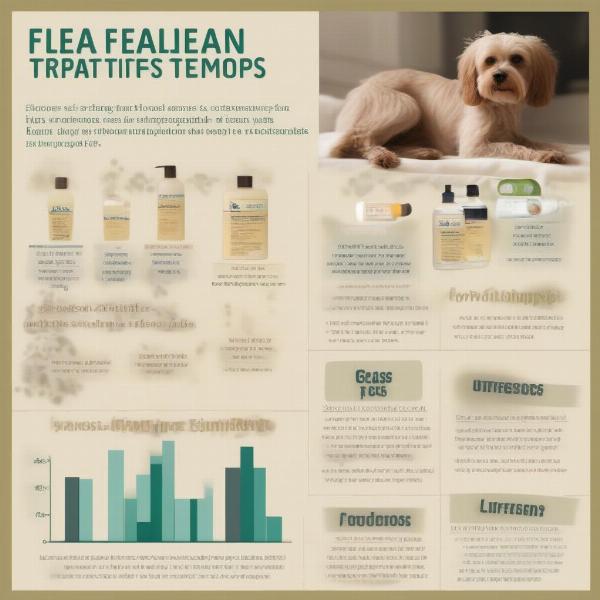Flea infestations can be a real nuisance for any dog, but small dogs are particularly vulnerable. Their smaller size means fewer bites are needed to cause significant irritation and potential health problems. Finding the right dog flea treatment small dogs can tolerate and that is effective is crucial. This guide will help you navigate the various options available, understand the potential risks, and choose the best course of action for your tiny companion.
Choosing the Right Flea Treatment for Your Small Dog
Selecting a suitable flea treatment for your small dog requires careful consideration. Always consult your veterinarian before starting any new flea treatment, especially for puppies, pregnant or nursing dogs, or dogs with underlying health conditions. They can advise on the most appropriate product and dosage based on your dog’s specific needs. Never use dog flea treatment on cats, as it can be toxic. For small dogs, precise dosing is critical, so pay close attention to product instructions.
Types of Flea Treatments for Small Dogs
Several types of flea treatments are available for small dogs, each with its own pros and cons:
- Topical Treatments: Applied directly to the skin, usually on the back of the neck. These are easy to apply and come in various formulations.
- Oral Medications: These are pills or chewables that kill fleas from the inside out. They are generally highly effective but may have more potential side effects.
- Flea Collars: These collars release insecticide over time, providing continuous protection. However, some dogs may experience skin irritation from the collar.
- Flea Shampoos: While effective at killing fleas present on the dog at the time of bathing, they offer no long-term protection.
- Natural Remedies: Options like essential oils and diatomaceous earth can be used, but their effectiveness varies, and some can be harmful if ingested. Consult your vet before using natural remedies.
 Comparing various flea treatments for small breeds
Comparing various flea treatments for small breeds
Understanding the Risks and Side Effects
While most flea treatments are safe when used as directed, some dogs may experience side effects. These can range from mild skin irritation to more serious neurological problems. Always monitor your dog closely after applying any flea treatment and contact your vet immediately if you notice any unusual behavior.
Minimizing Risks
- Follow the instructions carefully: Use the correct dosage for your dog’s weight and age.
- Don’t over-treat: Applying more treatment than recommended will not increase effectiveness and may increase the risk of side effects.
- Consult your vet: If your dog has any health problems or is taking other medications, talk to your vet before using a flea treatment.
Preventing Future Infestations
Preventing fleas is often easier and less expensive than treating an infestation. Regular cleaning of your home, washing your dog’s bedding, and using a flea comb can help keep these pests at bay. You can also consider using preventative treatments year-round, especially in warmer climates.
Conclusion
Finding the right dog flea treatment small dogs need can be challenging. By understanding the available options, potential risks, and preventative measures, you can help your small dog live a flea-free and comfortable life. Remember to consult your vet for personalized advice and always follow product instructions carefully.
FAQ
- What is the safest flea treatment for small dogs? There is no single “safest” treatment, as each dog reacts differently. Consult your vet for a recommendation based on your dog’s specific needs.
- Can I use cat flea treatment on my small dog? No, cat flea treatments contain permethrin, which is toxic to dogs.
- How often should I treat my small dog for fleas? This depends on the product and your dog’s individual needs. Follow your vet’s recommendations.
- What are the signs of a flea allergy in small dogs? Excessive scratching, hair loss, and skin redness are common signs.
- What should I do if my small dog has a reaction to a flea treatment? Contact your vet immediately.
- Can I use natural flea remedies on my small dog? Consult with your vet before using any natural remedies as some can be harmful if ingested or used incorrectly.
- How can I prevent fleas in my home? Regular vacuuming, washing bedding in hot water, and treating your yard can help prevent infestations.
Related Articles on ILM Dog
ILM Dog is a leading international website dedicated to providing expert advice and resources for dog owners worldwide. We cover a wide range of topics, including breed selection, health and medical care, training, nutrition, grooming, and much more. Whether you are a new dog owner or a seasoned expert, ILM Dog offers valuable insights to help you provide the best possible care for your canine companion. We specialize in dog breeds, health & medical care, training & behavior, nutrition & feeding, grooming & hygiene, and products & accessories. Contact us for professional advice and support: Email: [email protected], Phone: +44 20-3965-8624. Visit ILM Dog today for more information.